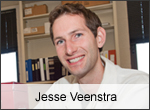
A student in the Wayne State University School of Medicine's M.D./Ph.D. program has been awarded a prestigious F30 fellowship by the National Institutes of Health for his research into the additional beneficial effects of cryotherapy in the fight against cancer.
Jesse Veenstra's award of the $199,000, five-year fellowship includes a stipend, 60 percent tuition coverage and a health insurance allowance for the remaining years of medical school and doctorate training.
Originally from Cadillac, Mich., Veenstra, who now lives in Royal Oak, has completed his first two years of medical school and is in his second year of doctoral studies in the cancer biology program.
Veenstra, 26, is studying cancer immunotherapy under Wei-Zen Wei, Ph.D., professor of Immunology and Microbiology for the School of Medicine and the Barbara Ann Karmanos Cancer Institute. Specifically, he is researching the mechanisms by which cryosurgery provides additional benefits in fighting cancer.
"Cancer is a difficult disease to treat due to its destructive nature," Veenstra said. "This is especially true in the aging population, where patients are less able to tolerate more aggressive therapies, such as invasive surgery and chemotherapy regimens. Alternatively, cryosurgery -- the use of freezing temperatures to destroy diseased tissue -- is increasingly recognized as an efficient, minimally invasive method of treating solid tumors. Compared to surgical resection, cryosurgery is less damaging to surrounding structures, places less stress on the body, has improved patient comfort, is more affordable and provides a better cosmetic result."
Perhaps more importantly, Veenstra noted, cryosurgery has the potential to induce an immunologic response to tumor-associated antigens released from the ablated tumor. That response can prevent tumor recurrence and is capable of eliminating distant metastatic origins.
But, since such a response has not yet been witnessed consistently clinically, and researchers don't yet know the mechanisms by which cryoablation induces anti-tumor immunity, the goal of Veenstra's project is to elucidate these mechanisms by studying the interaction between the immune regulatory system and cryoablation.
"We hypothesize that cryoablation in coordination with DNA vaccination and immune modulation will promote effector mechanisms and overcome suppressive elements to provide long-term anti-tumor protection capable of eliminating metastatic disease," he said.
Veenstra said he was attracted to the field of immunology and oncology since he was first exposed to basic pathology as an undergraduate student at Grand Valley State University, from which he received a degree in biomedical science.
"I enjoy the highly cerebral, problem-solving approach needed to understand the intricate workings of the immune system as well as the mechanisms of cancer development," Veenstra said. "After further exposure to each field throughout medical school it has been clear to me that both fields are heavily intertwined with one another."
After graduation, Veenstra plans to develop a career that combines clinical practice and research aimed at understanding the pathways by which immune memory and killing lead to cancer regression and how failures in these pathways can lead to cancer progression. "This will ultimately provide better diagnostic tools, management strategies and alternative treatment options for cancer patients who are not able to tolerate current therapies."